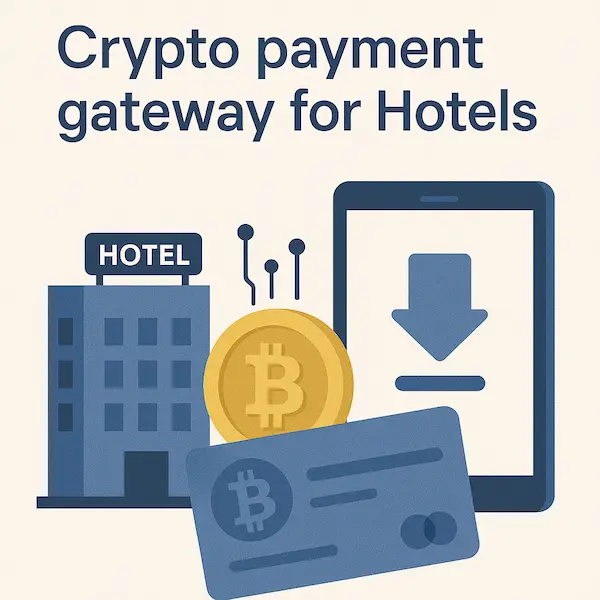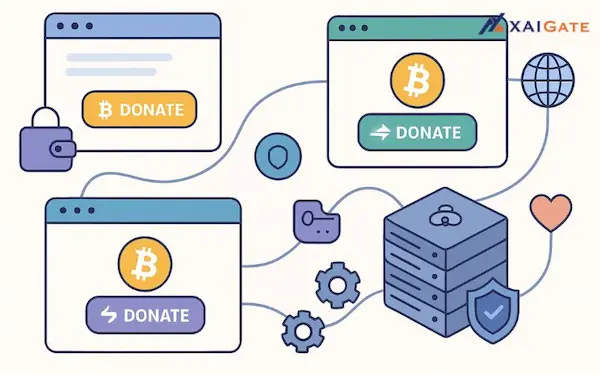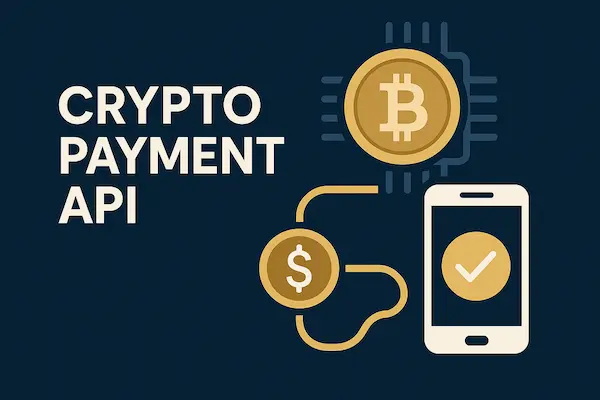Contents
- 1 1. Introduction – Why Hotels Can’t Ignore Crypto in 2026
- 2 2. Market Trends in Hotel Crypto Payments (2026 Update)
- 3 3. Pain Points of Traditional Hotel Payments
- 4 4. Benefits of a Crypto Payment Gateway for Hotels
- 5 5. How a Crypto Payment Gateway Works in Hotels
- 6 6. Use Cases in Hospitality
- 7 7. Compliance, Security & Risk Management
- 8 8. Choosing the Right Crypto Payment Gateway for Hotels
- 9 9. Implementation Roadmap for Hotels
- 10 10. ROI & Competitive Advantage
- 11 11. Segment Analysis – Which Hotels Benefit Most?
- 12 12. Latest News & Headlines in Hotel Crypto Payments
- 13 Conclusion
- 14 FAQs – Best crypto payment gateway for Hotels
1. Introduction – Why Hotels Can’t Ignore Crypto in 2026
The hospitality industry is moving into a new era of digital payments. What once sounded futuristic — checking into a hotel and paying with Bitcoin or USDC — is now becoming reality. Emirates has already announced plans to accept crypto for flights, Travala allows guests to book millions of rooms with stablecoins, and Alternative Airlines supports over 100 digital currencies across 600+ carriers worldwide. These are not experiments anymore; they are signs that blockchain is reshaping the way travel and accommodation work.
For travelers, especially Gen Z and Millennials, digital wallets and instant transactions are part of everyday life. They expect hotels to provide the same speed and convenience. For international guests, paying with stablecoins like USDC or USDT helps avoid costly FX conversions and card declines.
For hotels, adopting a crypto payment gateway for hotels is no longer about being trendy. It’s about securing a competitive edge, cutting unnecessary costs, and keeping pace with a global customer base that is already moving toward borderless digital finance.
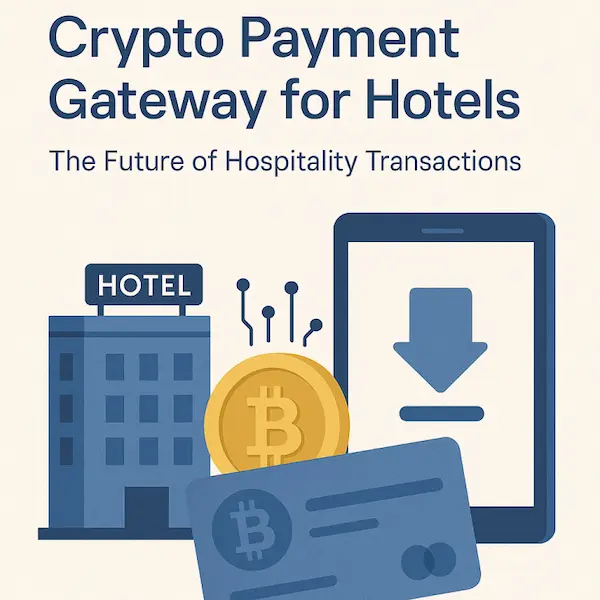
2. Market Trends in Hotel Crypto Payments (2026 Update)
The hospitality industry is entering a new payment era. By 2026, crypto is no longer a niche curiosity — it has become a mainstream option in travel and accommodation.
Rising adoption among global travelers
A growing share of travelers now expect to use digital assets when booking hotels, flights, and activities. Surveys suggest that more than 30% of international tourists are open to paying in stablecoins such as USDC or USDT. For this reason, many operators are rethinking their payment infrastructure. Implementing a crypto payment gateway for hotels gives properties the ability to meet this rising demand while staying ahead of the competition.
Airlines, OTAs, and hotels leading the way
The travel sector is often a testbed for payment innovation. Emirates, for example, has already announced crypto pilots; Travala supports USDC and other digital currencies for millions of travel products; and Alternative Airlines lets customers pay with more than 100 cryptos. These real-world cases prove that adopting a crypto payment gateway for hotels is no longer experimental — it is fast becoming an industry standard.
Why stablecoins are winning
While Bitcoin and Ethereum remain popular, their price volatility makes them risky for businesses that need predictable cash flows. Stablecoins are pegged to fiat currencies and settle quickly, which makes them ideal for hospitality. A crypto payment gateway for hotels that prioritizes stablecoins allows properties to process global transactions instantly without worrying about price swings or excessive FX fees.
A market set for rapid growth
Industry forecasts predict that the stablecoin market could surpass $3 trillion in the next few years. This creates a powerful incentive for hotels to modernize their payment systems. By adopting a crypto payment gateway for hotels today, properties can capture new demand, appeal to digital-first guests, and protect themselves from being left behind in the next wave of hospitality innovation.
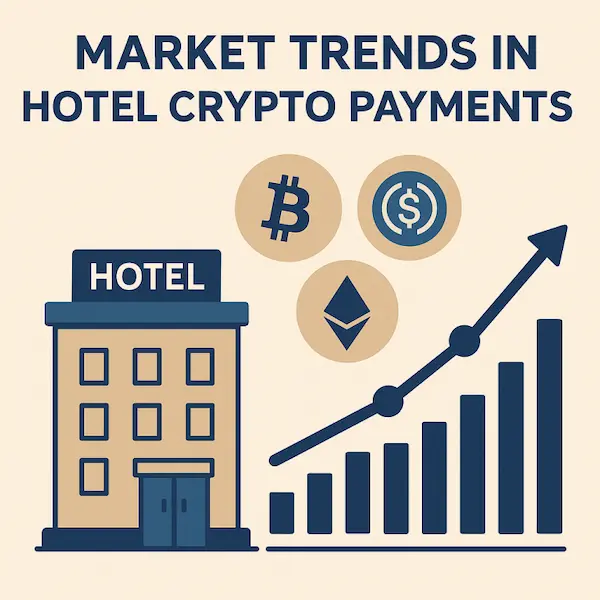
3. Pain Points of Traditional Hotel Payments
Even though credit cards and traditional banking have powered hotel transactions for decades, they come with serious drawbacks that affect both guests and operators. These limitations are exactly why more properties are turning to a crypto payment gateway for hotels.
High transaction and FX fees
Hotels lose a significant share of revenue to card networks, acquirers, and currency conversion charges. For international bookings, transaction costs can climb above 5%. A crypto payment gateway for hotels helps eliminate these layers of fees by settling payments directly on-chain at a fraction of the cost.
Slow settlements and cash flow challenges
Card settlements typically take between two and seven business days. For hotels, this creates cash flow delays that impact payroll, vendor payments, and reinvestment in guest experience. With a crypto payment gateway for hotels, funds can be settled in minutes, providing immediate liquidity.
Chargebacks and fraud risks
Chargebacks remain a huge pain point in hospitality. Guests may dispute charges long after checkout, leaving hotels vulnerable to revenue loss and administrative costs. Fraudulent bookings add even more risk. Payments processed through a crypto payment gateway for hotels are final, reducing exposure to disputes and fraud.
Limited accessibility for global travelers
Guests from markets with low credit card penetration often struggle to complete bookings. Traditional processors sometimes decline cards based on region, leading to lost revenue opportunities. By contrast, a crypto payment gateway for hotels enables borderless, universal acceptance — all a guest needs is a smartphone wallet.
Table 1: Traditional Payments vs. Crypto Payment Gateway for Hotels
| Criteria | Traditional Payments | Crypto Payment Gateway for Hotels |
|---|---|---|
| Transaction fees | 2–5% + FX charges | <1% average |
| Settlement speed | 2–7 business days | Minutes |
| Chargebacks | High risk | Nearly eliminated |
| Cross-border acceptance | Limited, costly | Global, borderless |
| Transparency | Intermediaries, opaque fees | On-chain, auditable |
4. Benefits of a Crypto Payment Gateway for Hotels
Adopting a crypto payment gateway for hotels isn’t just a tech upgrade—it’s a revenue, operations, and guest-experience upgrade rolled into one. Here’s what changes in practice:
Lower costs, quicker cash flow
Card processing, cross-border surcharges, and FX spreads eat into margins. On-chain payments typically carry leaner fees and settle in minutes, so funds hit your balance sooner—useful for payroll, vendor payments, and inventory.
Borderless acceptance for international guests
Travelers can pay from anywhere with a wallet (USDC, USDT, BTC, ETH), skipping card declines and surprise FX charges. Fewer payment failures → fewer abandoned bookings.
Fewer chargebacks and disputes
Blockchain payments are final. That significantly reduces classic chargeback loops and the overhead of evidence gathering, second-charge attempts, and write-offs.
Smoother ops with PMS/POS integration
Modern gateways plug into booking engines, PMS, and POS. You can reconcile payouts with downloadable reports, map taxes and folios correctly, and choose auto-conversion to fiat—or keep a portion in crypto.
Brand lift with digital-first guests
Accepting crypto signals modern, guest-centric service. It’s a differentiator for Gen Z/Millennial travelers and a reason to pick your property over a near-identical competitor.
Quick comparison (at a glance)
| Area | Legacy cards | Crypto rails |
|---|---|---|
| Fees | Higher, stacked (card + FX) | Leaner, transparent |
| Settlement timing | T+2–T+7 business days | Minutes |
| Chargebacks | Common, labor-intensive | Greatly reduced |
| Cross-border | Friction, declines, FX costs | Borderless, wallet-to-wallet |
| Reconciliation | Batch files, delays | Real-time payouts & logs |
Implementation wins you can feel in week 1
-
Turn on stablecoins first (e.g., USDC) to minimize volatility.
-
Add “Pay with Crypto” at checkout + front-desk QR.
-
Enable auto-conversion to your settlement currency for clean accounting.
-
Publish a short help article so guests know what to expect.
Bottom line: the right crypto payment gateway for hotels cuts costs, accelerates cash, reduces disputes, and wins over digital-native travelers—without disrupting existing systems.
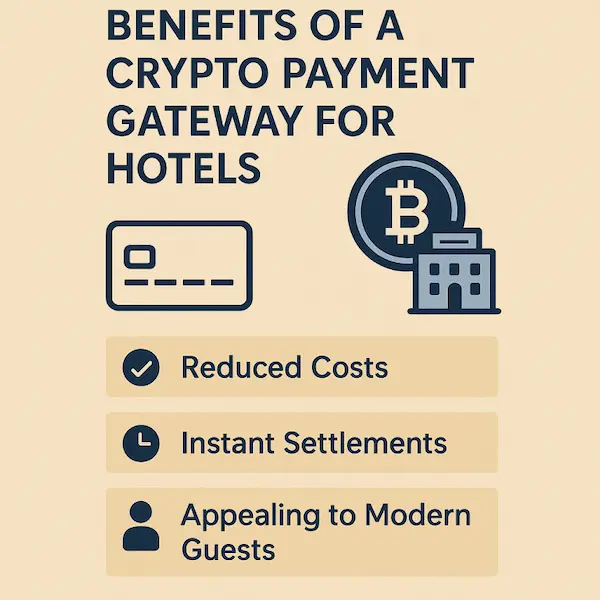
5. How a Crypto Payment Gateway Works in Hotels
For many hoteliers, the idea of accepting crypto sounds complicated. In reality, a crypto payment gateway for hotels works much like any other modern payment processor, but with faster settlement and more flexibility.
Guest-facing checkout
When a guest books online or arrives at the front desk, they simply select “Pay with Crypto” just as they would choose a credit card. A QR code or wallet address is generated, and the guest confirms payment with their mobile wallet.
Integration with booking systems
Gateways today are designed to plug directly into PMS (Property Management Systems) and POS (Point-of-Sale). That means payments flow straight into the hotel’s existing accounting and reconciliation tools, without requiring staff to manually track transactions.
Multi-currency acceptance
Most platforms support a mix of digital assets — Bitcoin, Ethereum, and especially stablecoins such as USDC and USDT. Stablecoins are preferred in hospitality because they maintain predictable value, making accounting and reporting simple.
Settlement options
Hotels can choose how they want to receive funds:
-
Convert automatically to fiat currency for smooth integration with banking.
-
Keep crypto on balance sheets as a diversification strategy.
-
Split payments between fiat and crypto to fit treasury preferences.
Compliance and audit trails
Every transaction is recorded on-chain, providing a transparent ledger that is easy to export for audits or tax filings. This level of visibility reduces disputes and gives finance teams more confidence in reporting.
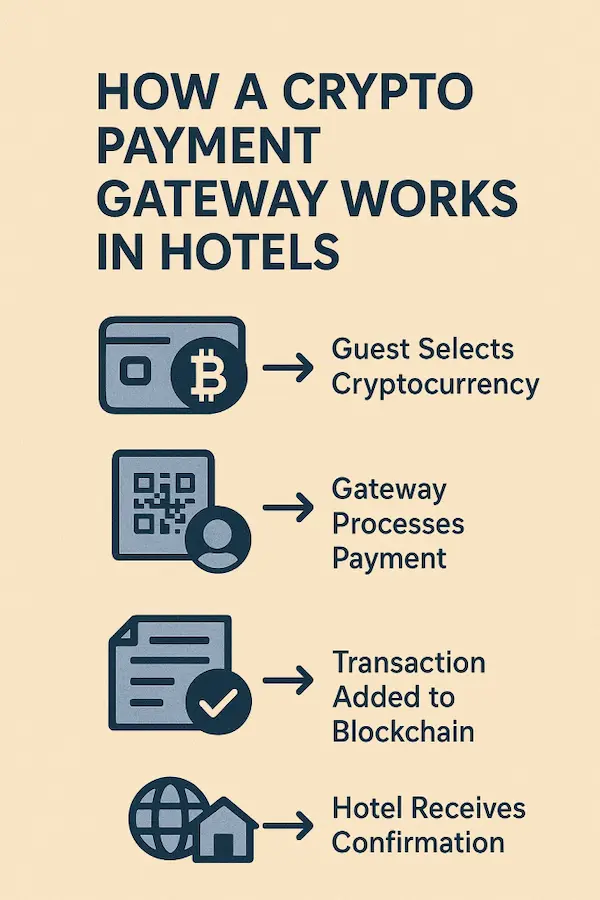
6. Use Cases in Hospitality
A crypto payment gateway for hotels is not limited to just room bookings. It can be applied across multiple revenue streams inside the property and throughout the guest journey.
Room bookings and OTA reservations
Guests can pay directly on the hotel’s website, mobile app, or through online travel agencies (OTAs) that support crypto checkout. This ensures smooth, borderless transactions with no extra FX fees.
Upsells: spa, dining, tours, and transport
From a spa treatment to airport pickup, guests can use digital assets to pay for services on the spot. A QR code at the restaurant or front desk makes it as simple as tapping a phone.
Group and event deposits
Weddings, conferences, and corporate retreats often involve large upfront payments. Crypto rails make these transfers fast and irreversible, giving hotels security and better cash flow.
Loyalty programs and rewards
Hotels can issue token-based loyalty points or even NFTs that serve as digital perks. Guests might earn cashback in stablecoins for repeat stays, creating stronger brand engagement.
7. Compliance, Security & Risk Management
While the benefits are clear, hotels must also balance innovation with regulation. A crypto payment gateway for hotels should include built-in compliance features to protect both guests and operators.
AML and KYC requirements
Gateways must screen transactions for suspicious activity, ensuring compliance with Anti-Money Laundering (AML) and Know Your Customer (KYC) rules. This helps properties avoid fines and reputational damage.
Tax and accounting transparency
Stablecoins reduce volatility, but hotels still need clear reporting. Gateways provide downloadable ledgers and daily payout files, making it easier to reconcile with local tax requirements.
Reducing volatility risk
Hotels can mitigate exposure by choosing auto-conversion to fiat or accepting primarily stablecoins. This balances innovation with financial stability.
Building guest trust
Transparent receipts, secure QR codes, and blockchain audit trails show guests that their payments are safe. By partnering with a compliant provider, hotels send a clear signal of professionalism and reliability.
8. Choosing the Right Crypto Payment Gateway for Hotels
Not every platform is built with hospitality in mind. To truly benefit, hotels should select a provider that aligns with operational, financial, and compliance needs. A well-designed crypto payment gateway for hotels should include the following:
Must-have features
-
Stablecoin-first support → Hotels should prioritize gateways that focus on USDC or USDT for predictable value and faster settlement.
-
PMS and POS integration → Direct plug-ins to systems like Opera or Micros avoid manual reconciliation.
-
KYC/AML compliance tools → Built-in address screening and reporting keep operations compliant.
-
Settlement flexibility → Options to auto-convert to fiat, hold crypto, or split payouts.
Comparing leading providers
Not all gateways are equal when it comes to hospitality. Some are designed for general e-commerce, while others—like XaiGate—focus on travel and hotels.
| Provider | Fees | Stablecoin Support | PMS Integration | Hospitality Focus |
|---|---|---|---|---|
| XaiGate | 0.2% | USDC, USDT, BUSD + others | Yes | ✅ Yes |
| Coinbase Commerce | ~1% | Limited | No | ❌ General use |
| BitPay | ~1% | Moderate | No | ❌ General use |
Hotels that pick a crypto payment gateway for hotels designed specifically for their industry will experience smoother integration, stronger compliance, and a better guest experience compared to general-purpose platforms.
9. Implementation Roadmap for Hotels
Launching a crypto payment gateway for hotels may sound complex, but in practice it can be done in under a month if approached step by step. Here’s a simple roadmap most properties can follow:
Step 1 – Select currencies and networks
Start with stablecoins like USDC or USDT, which provide predictable value and instant settlement. Add Bitcoin or Ethereum later as optional methods for tech-savvy guests.
Step 2 – Integrate via plugin or API
Most gateways offer plugins for booking engines and PMS systems, or QR-based solutions for front desk and POS. Choose the method that minimizes disruption to existing workflows.
Step 3 – Train staff and update SOPs
Front-desk agents and finance teams should understand how crypto checkouts work. A brief training ensures smooth operations and builds confidence when guests ask about payment options.
Step 4 – Market the new payment option
Promote your new capability with website banners, OTA descriptions, and in-lobby signage. Highlighting that you accept digital assets can be a powerful differentiator.
Step 5 – Monitor performance and ROI
Track metrics like % of bookings via crypto, average transaction size, fee savings, and settlement times. Hotels using a crypto payment gateway for hotels often see faster liquidity and higher international conversions within weeks.
10. ROI & Competitive Advantage
For hotel operators, every payment method must justify itself in terms of cost savings, guest satisfaction, and long-term competitiveness. A crypto payment gateway for hotels delivers measurable ROI on all three fronts.
Direct financial impact
Hotels can cut transaction costs by 30–50% compared to card networks. Stablecoin settlements happen in minutes, improving liquidity and freeing up capital for reinvestment. Over a year, this can translate into significant savings, especially for properties handling thousands of international bookings.
Increased conversion from global travelers
Crypto payments reduce booking friction for international guests who may face card declines or steep FX charges. By accepting digital currencies, hotels can win a larger share of global traffic, reduce abandoned bookings, and appeal to travelers in emerging markets where card penetration is low.
Competitive differentiation
In crowded markets, hotels often struggle to stand out. Offering crypto checkout signals innovation and guest-centric service. Travelers — particularly Gen Z and Millennials — are more likely to choose a property that accepts modern payment methods over one that doesn’t. A crypto payment gateway for hotels can therefore serve as a unique selling point.
Long-term brand positioning
By adopting blockchain-based payments now, hotels build a reputation as forward-thinking and future-ready. This not only boosts immediate guest loyalty but also positions the brand as an industry leader when crypto becomes mainstream across travel.
11. Segment Analysis – Which Hotels Benefit Most?
Not every property will use crypto in the same way, but almost all can benefit from the right setup. A crypto payment gateway for hotels creates unique advantages across different segments of the hospitality industry.
Luxury chains
High-end travelers often expect the latest conveniences. Accepting crypto aligns with their lifestyle, especially for international guests who move large sums quickly. For luxury hotels, a crypto payment gateway for hotels adds exclusivity and reinforces a premium, innovative brand image.
Boutique and independent hotels
Independent properties usually operate with tighter margins and less bargaining power against card processors. By lowering fees and enabling instant payouts, a crypto payment gateway for hotels can provide meaningful savings and cash flow improvements. This helps boutique hotels reinvest in guest experience and compete with larger chains.
Resorts and casinos
These properties handle diverse revenue streams — from accommodations to entertainment, gaming, and events. A crypto payment gateway for hotels lets them streamline large deposits, cross-border transactions, and even loyalty programs. Resorts in tourist-heavy regions can also use crypto to attract guests from countries with limited access to international cards.
12. Latest News & Headlines in Hotel Crypto Payments
The conversation around digital assets in hospitality isn’t hypothetical anymore — it’s making global headlines. Hotels that act early by adopting a crypto payment gateway for hotels are already benefiting from this momentum.
Emirates signals crypto adoption
In 2026, Emirates announced steps toward integrating crypto payments into its services. This move by a flagship airline highlights how the travel sector is preparing for digital-first guests and sets the tone for hotel groups to follow.
Travala expands stablecoin support
Travala, one of the leading blockchain-based booking platforms, continues to accept USDC and other stablecoins for millions of hotels worldwide. Its growth proves that crypto is more than a niche option — it’s a mainstream travel payment channel.
Alternative Airlines offers 100+ crypto options
With support for over 100 digital currencies across 600+ airlines, Alternative Airlines has demonstrated that crypto payments are scalable. Hotels can mirror this success by implementing a crypto payment gateway for hotels that offers multi-currency support.
Boutique hotels join the trend
Independent hotels in Europe and Asia are beginning to test stablecoin checkouts at the front desk. These early adopters are using crypto acceptance not just as a payment method, but as a marketing advantage to attract global, tech-savvy travelers.
Conclusion
The future of hotel payments is already here. Traditional card networks with high fees, long settlement times, and chargeback risks are giving way to faster, cheaper, and borderless solutions. By adopting a crypto payment gateway for hotels, properties can reduce costs, unlock instant cash flow, and appeal directly to the growing base of digital-first travelers.
Hotels that move early will enjoy a clear competitive advantage — whether it’s luxury chains positioning themselves as innovators, boutique hotels protecting margins, or resorts expanding their reach to international guests.
Now is the moment to take action. Don’t let your property fall behind while others lead the way.
Book a demo with XaiGate today and see how a crypto payment gateway for hotels can transform your guest experience, streamline operations, and future-proof your revenue.
For daily updates, subscribe to XAIGATE’s blog!
We may also be found on GitHub, and X (@mxaigate)!
FAQs – Best crypto payment gateway for Hotels
1. What is a crypto payment gateway for hotels?
It is a digital platform that allows hotels to accept cryptocurrencies such as Bitcoin, Ethereum, or stablecoins like USDC. The gateway integrates with booking engines or front-desk systems so guests can pay quickly and securely.
2. Why should hotels consider accepting crypto payments?
Hotels can reduce transaction fees, speed up settlements, and attract international travelers who prefer borderless payment options. A crypto payment gateway also helps hotels avoid costly chargebacks.
3. Are stablecoins better than Bitcoin for hotel payments?
Yes. While Bitcoin is popular, its price volatility can complicate accounting. Stablecoins like USDC and USDT are pegged to fiat currencies, making them more reliable for hotels.
4. How fast can hotels receive funds with crypto payments?
Transactions settle within minutes, compared to 2–7 business days for traditional card payments. This improves liquidity and cash flow.
5. Do crypto hotel payments eliminate chargebacks?
Yes. Blockchain transactions are final and irreversible, which means hotels no longer face disputes and revenue losses common with card payments.
6. Can a crypto payment gateway integrate with PMS and POS systems?
Most modern providers offer plugins or APIs for property management systems (PMS) and point-of-sale (POS) platforms, making integration straightforward.
7. Is it safe for hotels to accept crypto?
Yes. Reputable gateways include AML/KYC compliance tools, address screening, and encrypted payment flows to ensure security for both guests and hotels.
8. Can hotels automatically convert crypto into fiat currency?
Absolutely. Hotels can choose to settle payments in fiat, keep a portion in crypto, or split payouts depending on treasury policies.
9. Do guests need special apps to pay with crypto?
Guests only need a digital wallet, such as MetaMask, Coinbase Wallet, or Trust Wallet, to scan QR codes and complete payment at checkout.
10. How do hotels market crypto payment options to guests?
Hotels can add “We Accept Crypto” badges on their websites, OTA listings, and front-desk signage. Highlighting crypto acceptance helps attract tech-savvy travelers.
Follow us!

